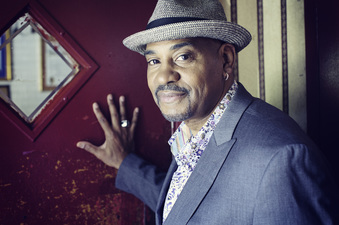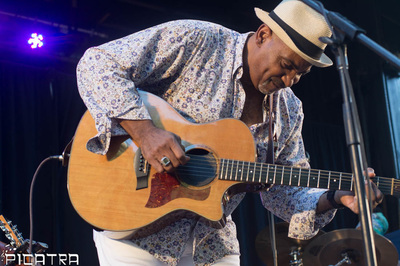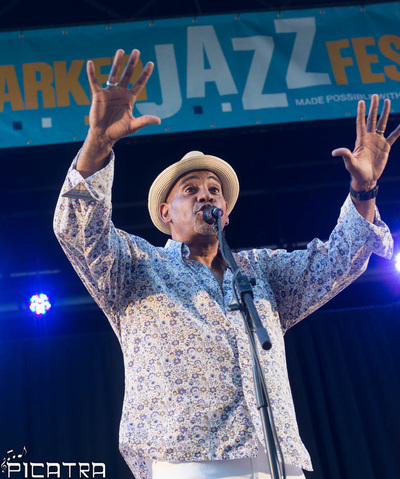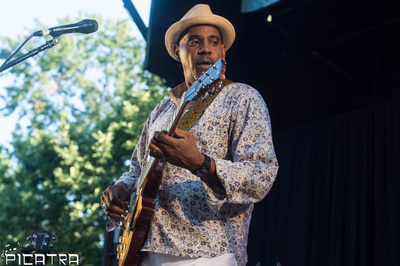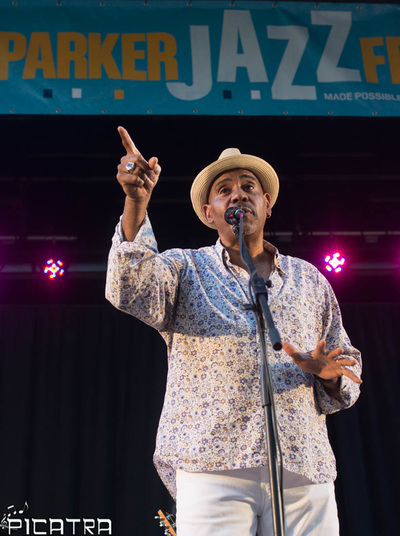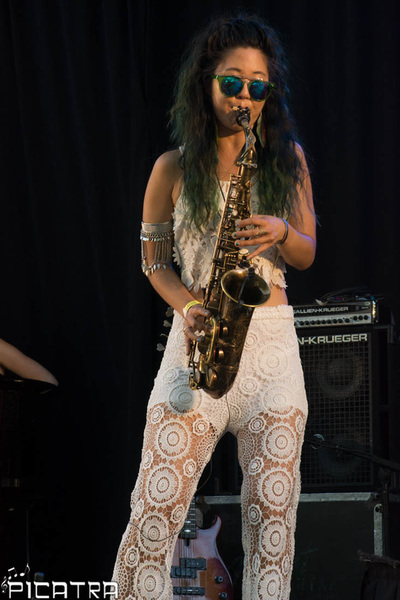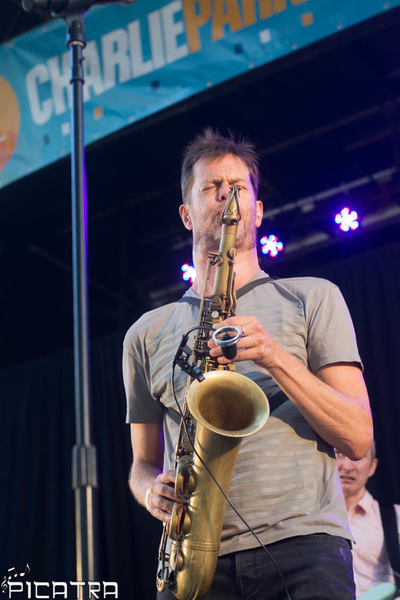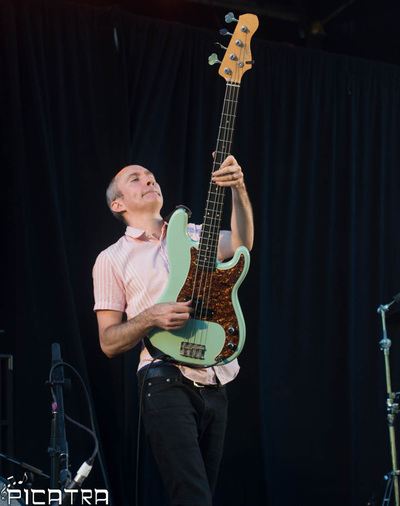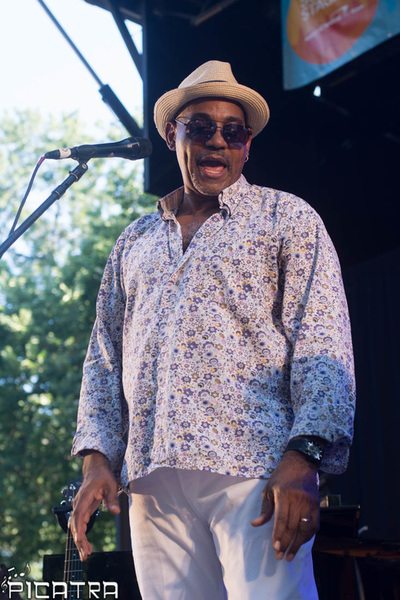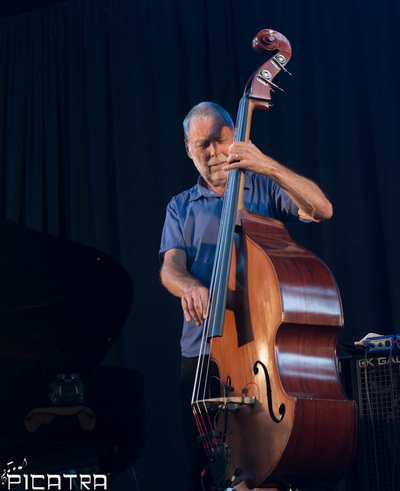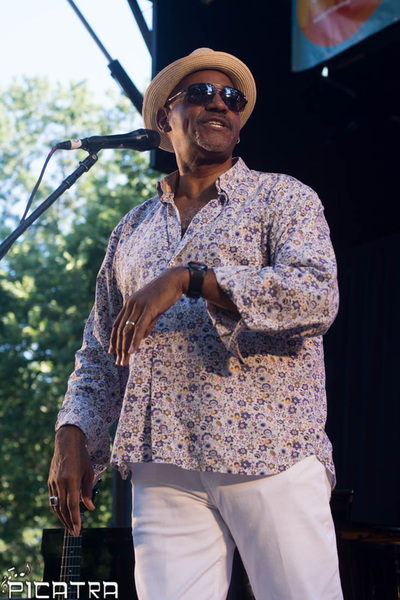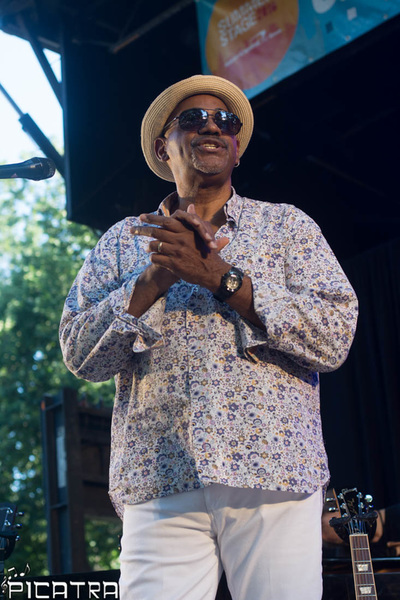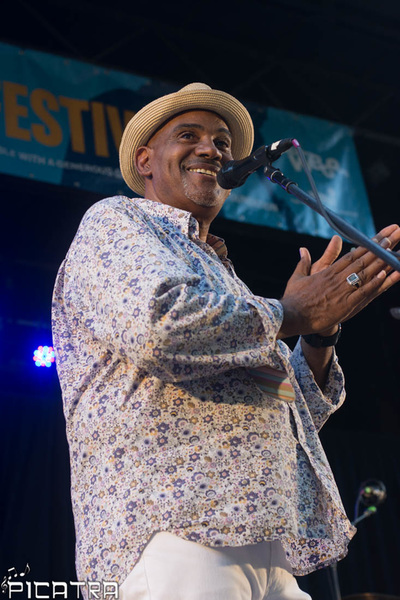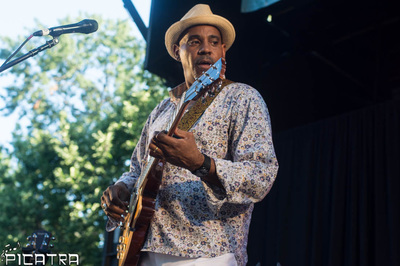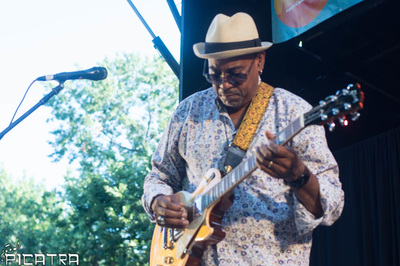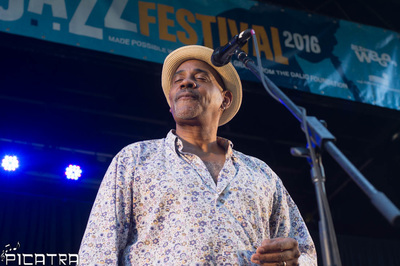Feature: Interview with Allan Harris
|
Allan Harris is an award winning Jazz vocalist, guitarist, and songwriter from Harlem, New York. His new album Nobody's Gonna Love You Better (Black Bar Jukebox Redux) is his eleventh album, a follow up to the 2015 Black Bar Jukebox, which received high acclaims. According to the New York Times he is “a protean talent…” Harris has spent the past 20 years steadily honing a stellar reputation as one of the finest vocalists of his era. He has received numerous awards, including the New York Nightlife Award for "Outstanding Jazz Vocalist" (which he won three times), the Backstage Bistro Award for "Ongoing Achievement in Jazz," the Harlem Speaks "Jazz Museum of Harlem Award," and the DownBeat. |
Critic's Poll Award for "Rising Star Vocalist." He is performing at SummerStage 2016 as part of the Charlie Parker Jazz Festival, a celebration of the Centennial anniversary of Jazz. We caught up with him to talk about the illustrious Jazz genre, his career, Harlem upbringing, working with Grammy award-winning producer Brian Bacchus and more!
When did you begin singing?
There was no exact of definitive moment that I can recall when I began to sing, for me singing was, and still is, a natural part of my makeup as a feeling and creative being. But if I was to single out a moment when I recognized my appeal to a listening audience, be it as small as it was, was during a talent show thrust upon me when I was in the third year of Grade School. My mother was adamant about her son being a sterling example of musical preparedness, so she chose a song that I would sing. I, along with my peers at school and the nuns who ran the talent show, were not prepared for the applause and accolades that followed when I finished my nervous rendition of “Blue Velvet.” They requested me to sing it again but now for the whole school! That, more than any other, was the moment I realized I had a gift and even more than that, that this gift had to be shared.
What or who are your musical inspirations?
Musical inspirations for me come from different factions. As a child my family exposed me to such a large range of music it is sometimes hard to just pinpoint one exact genre that has influenced me or one artist that I have gleaned from. When I am composing a tune or piece of music, there are a myriad of ideas that silently invade my choices for lyrics and melodies. I might hear a vamp that reminds me of Louis Armstrong playing a New Orleans riff or a soft melody that may resemble a song reminiscent of a Nat King Cole love ballad. There are also times when I have interjected elements of my Country and Rhythm & Blues influences. All in all, these different genres of music have molded me into the artist I am today, Allan Harris. But I couldn’t help but be influenced by artists like George Benson, Al Jarreau, Sam Cooke, and Ray Charles...these were four of my early musical heroes.
There was no exact of definitive moment that I can recall when I began to sing, for me singing was, and still is, a natural part of my makeup as a feeling and creative being. But if I was to single out a moment when I recognized my appeal to a listening audience, be it as small as it was, was during a talent show thrust upon me when I was in the third year of Grade School. My mother was adamant about her son being a sterling example of musical preparedness, so she chose a song that I would sing. I, along with my peers at school and the nuns who ran the talent show, were not prepared for the applause and accolades that followed when I finished my nervous rendition of “Blue Velvet.” They requested me to sing it again but now for the whole school! That, more than any other, was the moment I realized I had a gift and even more than that, that this gift had to be shared.
What or who are your musical inspirations?
Musical inspirations for me come from different factions. As a child my family exposed me to such a large range of music it is sometimes hard to just pinpoint one exact genre that has influenced me or one artist that I have gleaned from. When I am composing a tune or piece of music, there are a myriad of ideas that silently invade my choices for lyrics and melodies. I might hear a vamp that reminds me of Louis Armstrong playing a New Orleans riff or a soft melody that may resemble a song reminiscent of a Nat King Cole love ballad. There are also times when I have interjected elements of my Country and Rhythm & Blues influences. All in all, these different genres of music have molded me into the artist I am today, Allan Harris. But I couldn’t help but be influenced by artists like George Benson, Al Jarreau, Sam Cooke, and Ray Charles...these were four of my early musical heroes.
How did growing up in Harlem influence your music?
As an artist there was no place like Harlem! As a young boy of color I was surrounded and protected by a legion of talented and spiritual people who understood the dangers and stereotypes that would label me later on in life, as it had them. That is why Harlem was a sanctuary for the people who raised and guided me. A people who fled the constricts of communities where racism and the rules and laws of Jim Crow limited their access to opportunities and stifled their self expression. My mother was the first of our family to be sent to Harlem with the hope and promise to fulfill her dreams and destiny. She graduated from the first graduating class of the School of Performing Arts and became a highly admired classical pianist among her peers. This was during the heyday of the Harlem Renaissance. She in turn exposed me to the varied sounds and creative music Harlem had to offer. Bear in mind Harlem sat above the musical center of the world, Manhattan, so not only was my education influenced by Harlem, but I was also introduced to Opera, Broadway, Ballet and other forms of art Harlem and New York had to offer!
Did you always want to be a jazz artist? Did you explore any other genres?
Jazz was a term used by teachers and musicians I encountered when I was honing my craft as a young musician. It was easier to label what you were striving for in order to obtain work as a professional. In my home life as a child, jazz was just one form of music that had its roots in the American agrarian lifestyle and sounds. My people, hailing from the South, brought with them the Blues, Gospel, Ragtime, Country and Field Holler Music. Because my ear had been weaned on these sounds, jazz in my household was just another form of the music people of color developed and listened to. I was also fortunate to have close contact with some of the pioneers of this art form. Clarence Williams, who was one of America’s first African American producers, was an intimate associate of my family. My aunt had a child by him and we spent many weekends at his home in Queens where it was frequented by Louis Armstrong, Duke Ellington and others. So to answer this question, I feel I was born to be a Jazz artist as well as a storyteller of American music and that includes R&B, Rock, Blues, Folk, and Gospel. I have explored them all and they continue to influence my writing and arranging.
You have traveled the world performing, where was your favorite place? Why?
Traveling the world has shown me how fortunate I am to be a purveyor of this experiment we call America. What better way to be welcomed where-ever I go than to present this art form that so represents what I am about as a man of color. There have been places from Tokyo to Moscow from Caracas to Alberta, Canada where the audiences have delved into the history of this music more in depth than me. Tony Bennett once said to me that Jazz is our gift to the world and in my travels I feel that sometimes my audience looks upon me as that gift. If I had to choose a favorite place it would be America... it’s like the feel of a newborn child, fresh, innocent and still growing.
As an artist there was no place like Harlem! As a young boy of color I was surrounded and protected by a legion of talented and spiritual people who understood the dangers and stereotypes that would label me later on in life, as it had them. That is why Harlem was a sanctuary for the people who raised and guided me. A people who fled the constricts of communities where racism and the rules and laws of Jim Crow limited their access to opportunities and stifled their self expression. My mother was the first of our family to be sent to Harlem with the hope and promise to fulfill her dreams and destiny. She graduated from the first graduating class of the School of Performing Arts and became a highly admired classical pianist among her peers. This was during the heyday of the Harlem Renaissance. She in turn exposed me to the varied sounds and creative music Harlem had to offer. Bear in mind Harlem sat above the musical center of the world, Manhattan, so not only was my education influenced by Harlem, but I was also introduced to Opera, Broadway, Ballet and other forms of art Harlem and New York had to offer!
Did you always want to be a jazz artist? Did you explore any other genres?
Jazz was a term used by teachers and musicians I encountered when I was honing my craft as a young musician. It was easier to label what you were striving for in order to obtain work as a professional. In my home life as a child, jazz was just one form of music that had its roots in the American agrarian lifestyle and sounds. My people, hailing from the South, brought with them the Blues, Gospel, Ragtime, Country and Field Holler Music. Because my ear had been weaned on these sounds, jazz in my household was just another form of the music people of color developed and listened to. I was also fortunate to have close contact with some of the pioneers of this art form. Clarence Williams, who was one of America’s first African American producers, was an intimate associate of my family. My aunt had a child by him and we spent many weekends at his home in Queens where it was frequented by Louis Armstrong, Duke Ellington and others. So to answer this question, I feel I was born to be a Jazz artist as well as a storyteller of American music and that includes R&B, Rock, Blues, Folk, and Gospel. I have explored them all and they continue to influence my writing and arranging.
You have traveled the world performing, where was your favorite place? Why?
Traveling the world has shown me how fortunate I am to be a purveyor of this experiment we call America. What better way to be welcomed where-ever I go than to present this art form that so represents what I am about as a man of color. There have been places from Tokyo to Moscow from Caracas to Alberta, Canada where the audiences have delved into the history of this music more in depth than me. Tony Bennett once said to me that Jazz is our gift to the world and in my travels I feel that sometimes my audience looks upon me as that gift. If I had to choose a favorite place it would be America... it’s like the feel of a newborn child, fresh, innocent and still growing.
The upcoming centennial of the musical dawning of the term
“jazz” has prompted SummerStage to present the
Charlie Parker Jazz Festival.
How does it feel to be a part of that?
There are a myriad of artists SummerStage could have chosen for the Centennial. I am honored that they would consider, let alone chose me, to contribute my talents in front of their audience here in New York.
The upcoming centennial of the musical dawning of the term
“jazz” has prompted SummerStage to present the
Charlie Parker Jazz Festival.
How does it feel to be a part of that?
There are a myriad of artists SummerStage could have chosen for the Centennial. I am honored that they would consider, let alone chose me, to contribute my talents in front of their audience here in New York.
How has your music contributed to keeping jazz alive and strong?
There is an old Bedouin saying about the breeding of The Asil or Pure Arabian horse that aptly applies to this question. It states that, “Your duty is not to strive for it’s perfection, but not to contribute to it’s demise.” I feel that I am still finding my voice in this wide and wonderful world of Jazz. Each time I feel I am getting closer to understanding its cause and effect I realize it’s not to be analyzed and can never be fully understood, for as I grow as an artist, Jazz offers me another rung on this ladder of life that enables me to create and discover myself. In doing that and traveling the world, I feel I’ve contributed to keeping jazz alive and strong.
Tell us about your new album “Nobody’s Gonna Love You Better” (Black Bar Jukebox Redux)
My new album is somewhat of an extension of my last, “Black Bar Jukebox.” Having done quite a few tribute releases and assorted versions of standards from the American Songbook, I felt a moments reprise in my recording career was in order and needed to just take my listeners back with me to a time when I was free from the constraints of what is selling at the moment.
The term Black Bar Jukebox came about while discussing titles with my wife and record producer. They felt that since I was trying to capture the vivid and varied sounds of my youth why not take them to the acoustic labs that I was exposed to. They were the restaurants, diners and sometimes the bars that my relatives would let me be a fly on the wall in, while observing and listening to acts in Harlem and Brooklyn as a child. Each place had a jukebox and in it were 45’s that offered mostly pop ditties, from Country, R&B, Rock ’n Roll, Funk and yes, Jazz. The songs that I am presenting on this new recording mirror my listening experience as a boy and as a young man. It wasn’t unusual to hear a Johnny Cash song played before an Ella Fitzgerald tune or a Sam Cooke song before a Miles Davis tune. I loved the amalgamation of music these jukeboxes offered. But more than this, it let’s my listeners and fans hear and experience the type of music that has helped contribute to my growth as an artist.
You worked with Grammy award-winning producer Brian Bacchus on this album, who would you like to work with in the future?
I try to work with the people who see things differently than I do. I have found that it pushes me to write and create far beyond what I may do, left to my own devices. I would love to work with Tommy Lipuma, who just turned 80. I also wish I could have worked with Nesuhi Ertegun before he passed away or Arif Mardin. But I am at the stage in my career that it is not so difficult to find talented people but very hard to find those who see the things as I see them. In working with Brian Bacchus I have found a solid foundation for sharing ideas and reaching for things I might not have tried to do before. It’s a good fit and I’m enjoying the collaboration
There is an old Bedouin saying about the breeding of The Asil or Pure Arabian horse that aptly applies to this question. It states that, “Your duty is not to strive for it’s perfection, but not to contribute to it’s demise.” I feel that I am still finding my voice in this wide and wonderful world of Jazz. Each time I feel I am getting closer to understanding its cause and effect I realize it’s not to be analyzed and can never be fully understood, for as I grow as an artist, Jazz offers me another rung on this ladder of life that enables me to create and discover myself. In doing that and traveling the world, I feel I’ve contributed to keeping jazz alive and strong.
Tell us about your new album “Nobody’s Gonna Love You Better” (Black Bar Jukebox Redux)
My new album is somewhat of an extension of my last, “Black Bar Jukebox.” Having done quite a few tribute releases and assorted versions of standards from the American Songbook, I felt a moments reprise in my recording career was in order and needed to just take my listeners back with me to a time when I was free from the constraints of what is selling at the moment.
The term Black Bar Jukebox came about while discussing titles with my wife and record producer. They felt that since I was trying to capture the vivid and varied sounds of my youth why not take them to the acoustic labs that I was exposed to. They were the restaurants, diners and sometimes the bars that my relatives would let me be a fly on the wall in, while observing and listening to acts in Harlem and Brooklyn as a child. Each place had a jukebox and in it were 45’s that offered mostly pop ditties, from Country, R&B, Rock ’n Roll, Funk and yes, Jazz. The songs that I am presenting on this new recording mirror my listening experience as a boy and as a young man. It wasn’t unusual to hear a Johnny Cash song played before an Ella Fitzgerald tune or a Sam Cooke song before a Miles Davis tune. I loved the amalgamation of music these jukeboxes offered. But more than this, it let’s my listeners and fans hear and experience the type of music that has helped contribute to my growth as an artist.
You worked with Grammy award-winning producer Brian Bacchus on this album, who would you like to work with in the future?
I try to work with the people who see things differently than I do. I have found that it pushes me to write and create far beyond what I may do, left to my own devices. I would love to work with Tommy Lipuma, who just turned 80. I also wish I could have worked with Nesuhi Ertegun before he passed away or Arif Mardin. But I am at the stage in my career that it is not so difficult to find talented people but very hard to find those who see the things as I see them. In working with Brian Bacchus I have found a solid foundation for sharing ideas and reaching for things I might not have tried to do before. It’s a good fit and I’m enjoying the collaboration
Describe the most memorable moment of your career
I have had so many so called memorable moments that I have long since given up the celebration of each passing award, accolade or lingering applause. I have learned to love and appreciate the gift that has been bestowed upon me by my family, mentors and those who have helped paved the path of success for me. But I will try to answer the question and say the most memorable moment of my career will be tomorrow, for that will be the next time I step in front my fellow man and they will allow me to sing and tell my story.
In what ways do you give back to the community?
Sometimes money and pledges just aren’t enough. I have and will continue to do both when it comes to the needs and misfortunes of others. But I have found the most important gift is your time especially when it concerns the youth of a community. I support various charities that are close to my heart. First there is Challenge Aspen, which works with people with disabilities and wounded warriors. I’ve been raising money for them for over ten years now. I also support St. Mary’s Children’s Hospital which is a hospital in Queens that cares for children who are too sick to be cared for at home or who don’t even have a home. I have recently become involved in ASYV which stands for the Agahozo-Shalom Youth Village in Rwanda. This is an amazing organization that takes in children whose parents were lost or wounded in the Rwandan Genocide. I also give master classes to students all over the world from Berkley School of Music to the Jazz Aspen Snowmass Program led by Christian McBride for JAS Aspen. Furthermore in our travels, my band and I offer master classes and clinics to students in most cities.
Sometimes money and pledges just aren’t enough. I have and will continue to do both when it comes to the needs and misfortunes of others. But I have found the most important gift is your time especially when it concerns the youth of a community. I support various charities that are close to my heart. First there is Challenge Aspen, which works with people with disabilities and wounded warriors. I’ve been raising money for them for over ten years now. I also support St. Mary’s Children’s Hospital which is a hospital in Queens that cares for children who are too sick to be cared for at home or who don’t even have a home. I have recently become involved in ASYV which stands for the Agahozo-Shalom Youth Village in Rwanda. This is an amazing organization that takes in children whose parents were lost or wounded in the Rwandan Genocide. I also give master classes to students all over the world from Berkley School of Music to the Jazz Aspen Snowmass Program led by Christian McBride for JAS Aspen. Furthermore in our travels, my band and I offer master classes and clinics to students in most cities.
|
|

